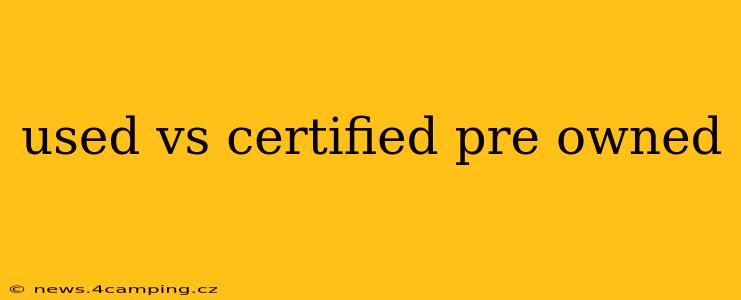Buying a pre-owned vehicle can be a smart financial decision, but navigating the terminology can be tricky. Two common terms you'll encounter are "used" and "certified pre-owned" (CPO). While both describe vehicles that aren't brand new, there are significant differences that impact price, warranty, and overall value. This guide breaks down the key distinctions to help you make an informed choice.
What is a Used Car?
A used car is simply a vehicle that's been previously owned and driven. There's no standardized inspection or certification process. The car's history is largely up to the seller to disclose, although some states have regulations regarding mandatory disclosures of accidents or major repairs. This means the condition can vary wildly, from meticulously maintained to needing significant work. Consequently, the price range for used cars is incredibly broad.
What is a Certified Pre-Owned (CPO) Car?
A certified pre-owned car is a used vehicle that has undergone a rigorous inspection and reconditioning process by the manufacturer or a participating dealership. This typically includes a comprehensive multi-point inspection covering mechanical, electrical, and cosmetic aspects. Cars that don't pass this inspection are not certified. The certification also frequently includes an extended warranty, offering greater peace of mind to the buyer. Only vehicles that meet specific age and mileage criteria are eligible for certification.
What are the Key Differences Between Used and CPO Cars?
The main differences lie in inspection, warranty, and price.
- Inspection: Used cars have no standardized inspection. CPO vehicles undergo a thorough multi-point inspection, ensuring they meet certain quality standards.
- Warranty: Used cars typically come with no warranty, or only a limited, short-term warranty provided by the seller. CPO cars almost always include an extended warranty, often covering major repairs beyond the manufacturer's original warranty.
- Price: CPO cars generally command a higher price than comparable used cars due to the added warranty and assurance of quality. However, the extended warranty and peace of mind often justify the increased cost for many buyers.
- History Report: While a history report is recommended for all used cars, a CPO car's history is typically thoroughly verified as part of the certification process.
- Reconditioning: CPO vehicles usually receive necessary repairs and reconditioning before being offered for sale, ensuring they're in better condition than a typical used car.
What are the Advantages of Buying a CPO Car?
- Extended Warranty: The extended warranty provides significant protection against unexpected repairs, potentially saving you substantial money.
- Peace of Mind: Knowing the car has undergone a thorough inspection offers greater confidence in its reliability and condition.
- Better Condition: CPO vehicles are typically in better overall condition than comparable used cars.
- Resale Value: CPO cars often retain their value better than comparable used cars.
What are the Advantages of Buying a Used Car?
- Lower Price: Used cars generally cost significantly less than CPO cars, making them a more affordable option.
- More Choices: The range of makes, models, and years available is typically broader for used cars.
What is the typical mileage and age limit for CPO cars?
The specific mileage and age limits for CPO certification vary depending on the manufacturer and model. However, it is generally within a certain time frame (e.g., under 5 years old) and mileage limit (e.g., under 60,000 miles). It's always best to check the specific requirements with the manufacturer or dealership.
Should I buy a used car or a CPO car?
The best choice depends on your individual budget, risk tolerance, and priorities. If budget is your primary concern and you are comfortable with the added risk, a used car might be the better option. However, if peace of mind, extended warranty coverage, and a higher level of assurance are more important, then a CPO car is likely the better choice despite the higher price.
Where can I find used and CPO cars?
Both used and CPO cars can be found at various dealerships, both franchise dealerships and independent used car lots. Online marketplaces like AutoTrader, Cars.com, and Kelley Blue Book also offer listings for both types of vehicles.
This guide provides a comprehensive overview, but always perform thorough research and consider consulting with a trusted mechanic before making your final decision. Remember, diligent research is key to making a confident and satisfying used car purchase.
